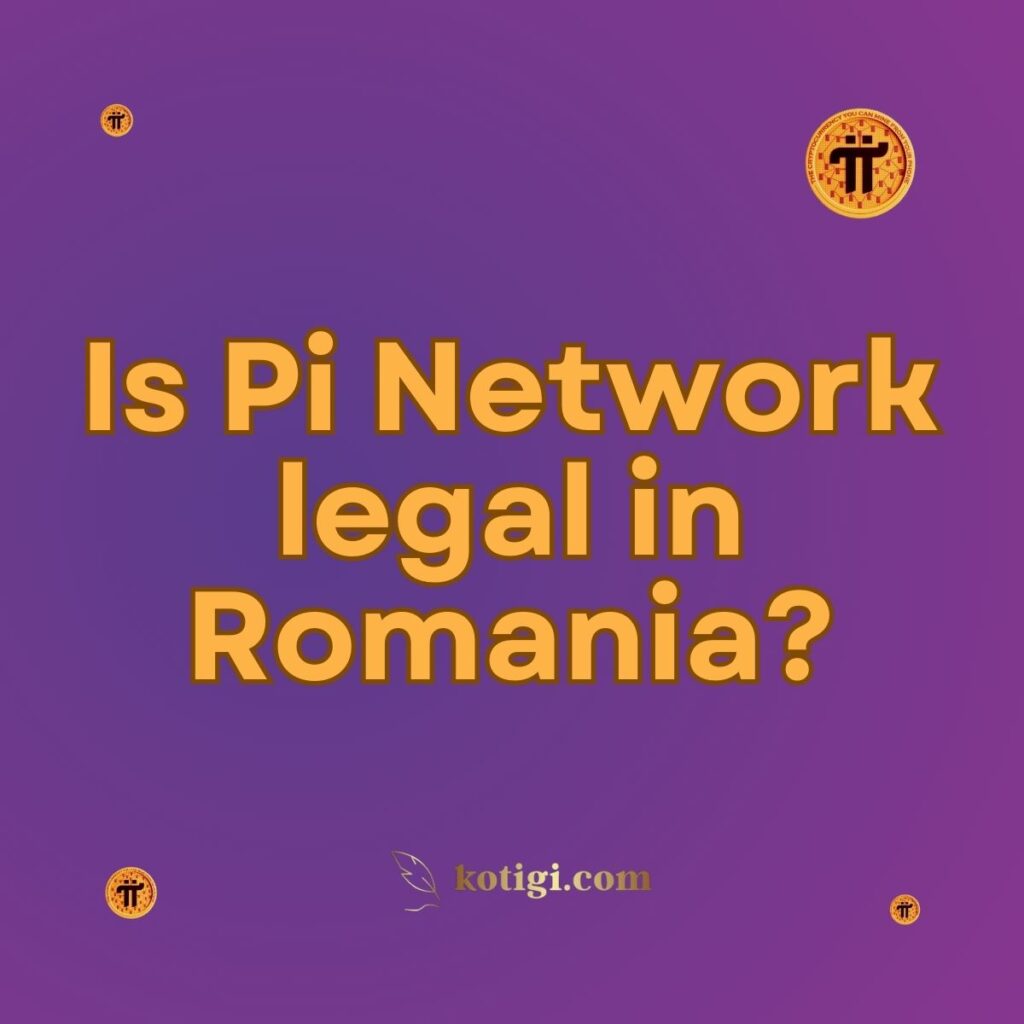
Is Pi Network legal in Romania?
Pi Network is not banned in Romania, but it operates in a regulatory gray area. Like many European Union (EU) countries, Romania has no specific laws governing Pi Network or other cryptocurrencies. Users should be aware of general EU regulations regarding digital currencies and remain cautious about potential future changes.
Introduction
As Pi Network grows in popularity across the globe, questions about its legal status in various countries continue to arise. In Romania, the cryptocurrency space remains largely unregulated, leaving Pi Network users in a legal gray area. While there is no outright ban on Pi Network or cryptocurrencies, the absence of clear laws means users must stay vigilant.
This article explores the current legal status of Pi Network in Romania, its compliance with EU regulations, and the key factors that users should consider as the cryptocurrency landscape evolves in the country.
Cryptocurrency Regulations in Romania
Absence of Specific Cryptocurrency Laws
Like many countries within the European Union, Romania does not have dedicated legislation that governs cryptocurrencies like Pi Network. This leaves platforms such as Pi Network in an undefined legal space where they are neither explicitly prohibited nor fully regulated.
Users in Romania can participate in Pi Network without legal restrictions at the moment. However, the lack of regulatory clarity means that users are also not fully protected under Romanian law if disputes or issues arise.
European Union Guidelines and Romania’s Stance
As an EU member, Romania follows the broader European Union guidelines on digital currencies. While the EU has yet to introduce comprehensive cryptocurrency regulations, there have been steps toward creating a unified legal framework across member states. This includes initiatives like the Markets in Crypto-Assets Regulation (MiCA), which aims to provide clearer rules for digital currencies.
Although MiCA is still under development, once it is adopted, Romania will be expected to comply, impacting how platforms like Pi Network are treated legally. Romanian users should pay close attention to these developments to ensure compliance with future laws.
Pi Network’s Role in Romania’s Financial Environment
Mobile Mining and Low Regulatory Risk
Pi Network’s mobile mining model allows users to mine Pi coins without heavy financial or technical investments. This system may not attract the same level of regulatory scrutiny as traditional cryptocurrencies, which often involve energy-intensive mining operations or high-stakes trading.
Because Pi Network does not currently engage in financial transactions or operate as a trading platform, it may avoid some of the legal complications that other cryptocurrencies face in Romania. However, this could change as Pi Network progresses toward its mainnet phase, where coins become tradable.
Romania’s General Caution Toward Cryptocurrencies
Romania has not shown an aggressive stance toward cryptocurrencies, but it has taken a cautious approach. The Romanian National Bank has issued warnings regarding the volatility and risks associated with digital currencies, highlighting concerns over fraud, money laundering, and the lack of consumer protection.
While these warnings are not specific to Pi Network, they reflect the overall cautious attitude that Romanian authorities have toward the cryptocurrency sector.
Legal Risks for Pi Network Users in Romania
Potential for Future Regulations
While Romania currently lacks comprehensive cryptocurrency laws, this situation could change in the coming years. As part of the EU, Romania is likely to adopt future regulations like MiCA, which could introduce new legal requirements for cryptocurrency platforms and their users.
Pi Network users should be aware that although they can participate in the platform without immediate legal consequences, future regulations may impose stricter rules regarding digital currencies. This could include taxation, user verification, or restrictions on trading activities once Pi Network’s mainnet launches.
Tax Implications and Reporting
Romanian law requires residents to report income from cryptocurrency trading or transactions under existing tax frameworks. While Pi Network’s coins are not currently tradable, users should be mindful of the potential tax implications once the coins gain market value.
Romania’s tax authorities are paying increasing attention to the cryptocurrency sector, and users may face penalties if they fail to report earnings from Pi Network once it transitions to its mainnet.
Regional and Global Trends Affecting Romania
EU-wide Cryptocurrency Regulation
The European Union is working toward unified cryptocurrency regulations through the MiCA framework. This regulation, once fully adopted, will impose rules on digital currencies across all EU member states, including Romania. MiCA is expected to cover areas such as investor protection, market integrity, and the issuance of digital assets.
Romanian users of Pi Network should be aware that once these regulations come into effect, the legal environment for cryptocurrencies will change. The platform may be subject to stricter oversight, and users may face additional legal obligations when it comes to Pi transactions or trading.
Global Examples of Regulatory Shifts
Globally, the approach to cryptocurrency regulation is shifting, with some countries opting for stricter oversight and others taking a more balanced approach. For example, China has implemented a blanket ban on cryptocurrency activities, while the United States is introducing gradual regulations to manage the industry without stifling innovation.
Romania could be influenced by both regional and global trends, especially as the EU finalizes its own regulations. Pi Network users should stay updated on both local and global developments to anticipate potential changes in the legal landscape.
The Future of Pi Network in Romania
Potential for Legal Clarity
As Pi Network continues to develop and eventually launches its mainnet, it will likely come under greater scrutiny from Romanian authorities, especially if it gains market value and becomes widely traded. If Romania adopts the MiCA framework, this could provide clearer guidelines for Pi Network users, giving them more legal certainty.
For now, Pi Network users in Romania can operate within the platform without violating any laws. However, as with any unregulated market, participants should remain cautious and stay informed about potential legal developments.
Importance of Staying Informed
With the cryptocurrency landscape constantly evolving, Pi Network users in Romania must remain vigilant. Monitoring both local and EU-wide regulatory trends will help users navigate any legal changes and stay compliant with potential new rules.
As Pi Network matures, legal considerations will become increasingly important, and users should be prepared for any shifts in Romania’s stance on cryptocurrencies.
Caution for Pi Network Users in Romania
Unregulated Market Risks
While Pi Network is not illegal in Romania, the platform operates in an unregulated market. This means that users have limited legal protections and could face challenges if the government introduces new laws governing cryptocurrencies.
Pi Network users should avoid making large investments in the platform until there is more clarity about its legal status and Romania’s future approach to cryptocurrency regulation.
Monitoring EU and Global Trends
Romanian users of Pi Network should also pay attention to EU-wide regulatory trends. As the European Union moves toward adopting regulations like MiCA, Romania’s legal framework for digital currencies will likely follow suit. Understanding these developments will help users mitigate legal risks and remain compliant as Pi Network grows.
Conclusion
Pi Network is currently legal in Romania, but the absence of specific cryptocurrency regulations places the platform in a legal gray area. While Romanian users can participate in Pi Network without restrictions, they should remain cautious, as future regulations, both at the national and EU levels, could impact the legal status of Pi Network.
As the cryptocurrency landscape continues to evolve, it is essential for Pi Network users in Romania to stay informed about local and global developments to ensure compliance and avoid potential legal challenges.
Key Takeaways
- No Specific Cryptocurrency Laws: Romania does not have dedicated laws regulating cryptocurrencies like Pi Network, leaving it in a legal gray area.
- EU Influence: Romania is part of the European Union, which is working on cryptocurrency regulations, including MiCA, that could affect Pi Network’s legal status in the future.
- National Bank Warnings: The Romanian National Bank has issued warnings about the risks associated with digital currencies, though no formal bans exist.
- Future Regulations: Pi Network users should be cautious, as Romania may introduce stricter regulations once Pi Network launches its mainnet and Pi coins become tradable.
- Stay Updated: Users should monitor local, regional, and global trends to stay compliant and avoid legal risks as the cryptocurrency landscape continues to evolve.




